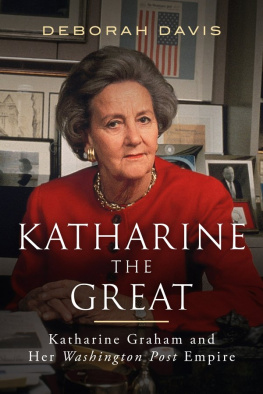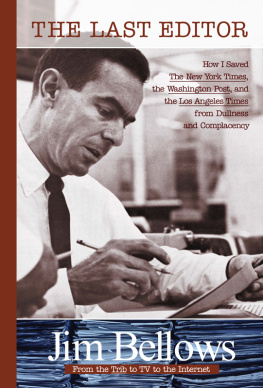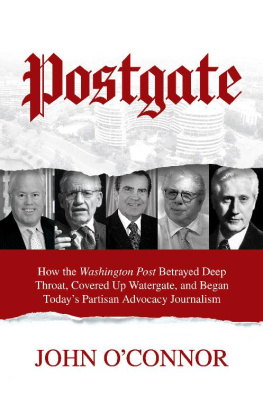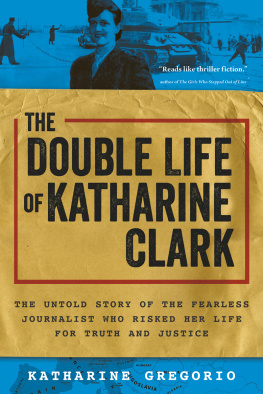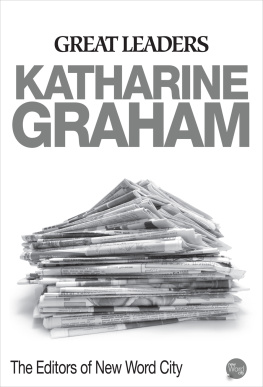A biography is considered complete if it merely accounts for six or seven selves, whereas a person may well have as many as one thousand.
Some are born great, some achieve greatness, and some have greatness thrust upon them.
How This Book Was Censored
THIS IS the third edition of a book originally written shortly after President Nixon resigned as a result of the Washington Posts investigation of the Watergate scandal. The conceptual center of the book is the question: Could Katharine Graham, as publisher of the Post, have been in the position to end the presidency of Richard Nixon by chance, or was that ability the result of something deeply rooted and systemic? Such an idea is at odds with the story of Watergate presented in such officially sanctioned books as All the Presidents Men, in which Post reporters Bob Woodward and Carl Bernstein are portrayed as finding out about Nixons crimes essentially by accident.
In researching the content of Katharine Grahams power, I found that both her late husband Philip, from whom she inherited the newspaper in 1963, and Benjamin Bradlee, whom she hired as executive editor in 1965, had been part of a group of men who worked with strategic information during the Second World War. These men had gone on to use their skills in propaganda or intelligence to create and reinforce peacetime definitions of patriotism. Their careers in this way coincided with the formation of the modern news industry; and it was not simply their access to the instruments of mass communication, but also their style of political thinking, their identification with the values of the state, which gave them and others of their background a disproportionate influence on American political culture. The relation of such careers to Katharine Grahams ability to destroy Richard Nixon is discussed in the book in detail.
Benjamin Bradlee as a young journalist was at the very heart of the governments effort to order political thinking after the war. He spent forty wartime months handling classified cables and codes on a naval destroyer, then three years at the Washington Post in the late 1940s under Philip Graham, who as a liberal anti-Communist supported the search for traitors in government. In 1951, Bradlee went, with Grahams assistance, to the American Embassy in Paris, where as a press attach he became part of a covert operation integral to Americas foreign policy: the production of propaganda against Communism. One purpose of the operation was to cast doubt on the patriotism of western European Communists, many of whom had fought in the resistance and were therefore trusted figures in post-war politics. They were discredited as instruments of Stalin. The propaganda was disseminated throughout Europe by the CIA, mainly in the form of newspaper stories appearing under the bylines of pro-American foreign journalists.
In the original edition of this book, Bradlee was described as a State Department appointee who, while at the embassy, produced CIA material only occasionally, before returning permanently to journalism. Those few lines, and other references to his past, Bradlee denied vehemently. Rather than join the company of other prominent journalists who now freely say they worked with the CIA in the 1950s because times were different then, it was the patriotic thing to do, Bradlee set about to discredit the book, and ruin me as a writer, by having friends produce negative press stories.
Harcourt Brace Jovanovich had bought the rights to Katharine the Great in early 1978, when it was half-finished, and announced publication for fall 1979. The chairman of the company, William Jovanovich, had reviewed the final manuscript and said Katharine Graham was not going to tell him what he could publish. He put the machinery in motion to make Katharine a bestselling book; the sales force took prepublication orders on the entire 25,000 copy first print run, sold rights to the Literary Guild, and recorded bids from a British publisher and seven American paperback houses. He also sold an excerpt about the Posts intelligence connections to the prestigious New York magazine; the excerpt was scheduled to run the same week the book hit the bookstores.
Just before New York went to press, however, Bradlee learned of the article and threatened to sue the magazine. So the article was aborted. Village Voice columnist Alexander Cockburn, who was living with Katharine Grahams daughter, explained this to his readers as having been caused by the fact (untrue) that I had become hysterical when an editor at New York questioned some of my information. Cockburns article came out just as copies of Katharine were reaching the bookstores. Harcourt Brace suspended plans for publicity until the article had been reviewed by its lawyers.
Two weeks went by without publicity or reviews, and then Wall Street Journal writer David Ignatius, son of former Washington Post Company president Paul Ignatius, called me at home to say he was drafting an Op-Ed piece thats going to say you were right about Deep Throat. The book said that Deep Throat was Richard Ober, the CIAs deputy chief of counterintelligence. It also said Ober had known Woodward when he was a naval communications officer at the Pentagon and the White House, and had known Bradlee when they were both at Harvard in the early 1940s.
The call from Ignatius came on a Sunday, and he wanted me at his office right away, that day, with my interview notebooks, which he said he needed to be sure of his facts before he could run the story. I hurried downtown in the rain with my notebooks.
Ignatius greeted me tensely, a young man around thirty, my age, with arms too short for his body. We sat in padded chairs at one end of a vast office, and he opened aggressively, How can you do this to poor Ben Bradlee? Do you want to ruin his career? For more than two hours, he questioned me angrily: Who told you this? Who told you that? Was it________, or was it______, or was it_______? That guys given people some bad information. I nervously searched my notebooks, aware now of his intentions but believing, naively, that the right answers would make a difference. At four oclock, suddenly, he broke off; Im due at Woodwards house, Im late, I have to call him and tell him how its going; and we watched each other while he moved his mouth into the receiver of a black telephone.
His article, printed on the Journals editorial page, said that my book was garbage... the only interesting thing about it is wondering who is going to sue for libel first. The Journal identified Ignatius as an intelligence specialist; it did not disclose his fathers relationship with the Washington Post.
Richard Ober, for his part, had his lawyer begin negotiating with Harcourt Brace to have certain lines about his association with the White House Plumbers Unit deleted from the second edition. He said he was not involved in any way with the Plumbers criminal break-ins. But the letter from Obers attorney did not deny my claim that he was Deep Throat, nor that he had known Woodward at the Pentagon or Bradlee in the mid-1940s when they were both in the exclusive Hasty Pudding Club at Harvard. I went to New York to discuss the situation with Harcourts attorney, David Blasband. When I got there, Blasband was smiling. We did it! he exclaimed, waving Obers letter. No denial! The changes Ober wanted left my analysis of his role in Watergate essentially unaltered. The pages, with Obers changes, went to the Literary Guild in December, and the Guild featured

